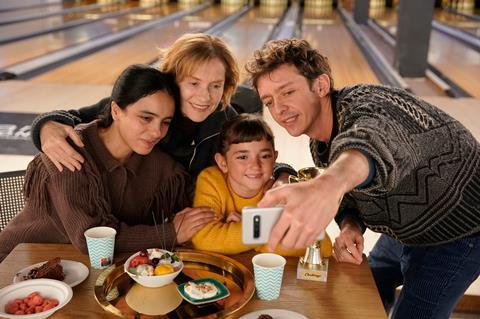Andre Techine’s latest stars Isabelle Huppert as a police officer caught in a moral dilemma

Dir: Andre Techine. France. 2023. 85mins
Reunited with Isabelle Huppert for the first time since The Bronte Sisters (1979), writer/director Andre Techine has created a compact contemporary tale of the ethical dilemmas facing a weary police officer torn between duty and compassion. A touching performance from Huppert should help draw attention to one of Techine’s most forceful and commercial films in some time, even if the bland English title is not the film’s greatest selling point.
A tightly focused blend of personal drama and social commentary
Less than a year after the French release of Soul Mates, Techine returns with a tightly focused blend of personal drama and social commentary that is steeped in sympathy for public servants entrusted with protecting the lives of their fellow citizens. My New Friends begins with a public protest against the high rate of suicide among French police officers and a rousing rendition of ’La Marseillaise’. The lack of understanding about the pressures facing the police is a recurring theme that finds its individual face in Lucie (Huppert)
A year after the suicide of her partner and fellow police officer Slimane (Moustapha Mbengue), Lucie is ready to return to work rather than accept retirement. She claims to have no friends or family beyond her police colleagues, although she resists any concern shown by Slimane’s brother and fellow cop Serge (also played by Mbengue). At this point of vulnerability, the lonely Lucie encounters her new neighbours – schoolteacher Julia (Hafsia Herzi), aspiring artist Yann (Nahuel Perez Biscayart) and their eight year-old daughter Rose (Romane Meunier).
She quickly becomes bound up in the family’s life; driving Rose to her figure skating lessons, sharing meals with them, playing bowls together. It becomes a flourishing relationship based on falsehood. Lucie never tells the family she is with the police, brushing aside questions about her working life by claiming to be a civil servant. She also knows that Yann is currently on probation, and has a history as an activist and anti-capitalist protester.
Techine convincingly charts how the normality of family life is so appealing to Lucie. Herzi’s Julia is hard-working and responsible, Biscayart’s Yann is an incorrigible idealist who is as impulsive as an adolescent, and Rose could be the daughter or granddaughter that Lucie never had. Huppert seems to glow in the warmth of their presence.
Set around the coastal town of Perpignan, the film underplays the professional world of the main characters. We see little of Lucie’s police work beyond interactions with her boss (Stephane Rideau from Techine’s Les Roseaux Sauvages in 1994). Instead, she jogs, cooks, gardens and welcomes ghostly visits from Slimane. Equally, we glimpse little of Yann’s direct activism. Instead, we witness the gradual friendship that grows between the four, Lucie responding to the family as a caring individual rather than a police officer. It is that sense of decency and hunger for emotional connection that gradually threatens to compromise her.
Cinematographer George Lechaptois captures the dry anonymity of the bland suburban settings, adding warmth in the shadowy interiors of nighttime bars and twinkling festive season interiors. Despite a relatively trim running time, Techine does justice to the characters and the issues addressed. This is a police story without a shot fired in anger, any whiff of impropriety or a great mystery to be solved. Instead, the focus is on ordinary people, painful choices and the price of principles.
The discovery of common ground between people who seem worlds apart has been a constant in Techine’s 50-year career. He revisits that theme here with a conviction that is highly engaging.
Production companies: Les Films Du Worso
International sales: Pyramide International sales@pyramidefilms.com
Producers: Sylvia Pialat, Benoit Quainon
Screenplay: Andre Techine, Regis de Martrin-Donos
Cinematography: George Lechaptois
Production design: Lise Peault
Editing: Albertine Lastera
Music: Olivier Marguerit
Main cast: Isabelle Huppert, Hafsia Herzi, Nahuel Perez Biscayart, Romane Meunier
























